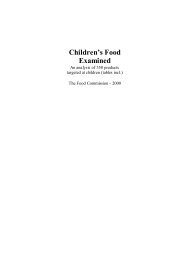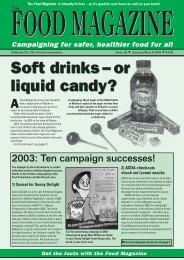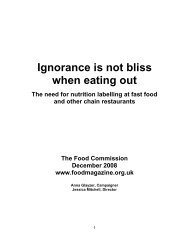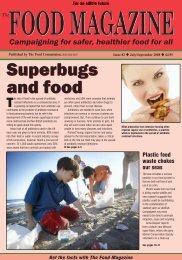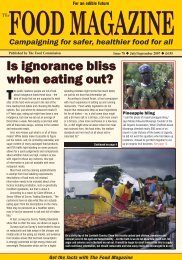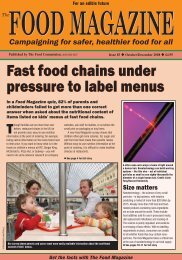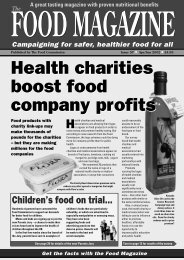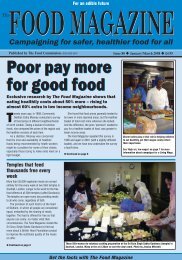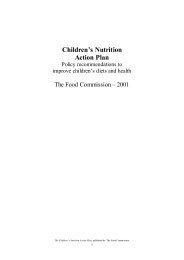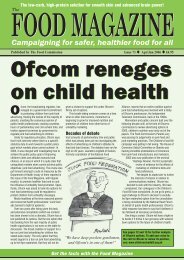Food Magazine - The Food Commission
Food Magazine - The Food Commission
Food Magazine - The Food Commission
Create successful ePaper yourself
Turn your PDF publications into a flip-book with our unique Google optimized e-Paper software.
advertising<br />
Legal, decent,<br />
honest and true<br />
<strong>The</strong> activities of the advertising industry raise many important questions<br />
for nutrition and health. Here we report on complaints against food and<br />
drink companies considered by the Advertising Standards Authority (ASA)<br />
in recent months.<br />
XDairy calcium not ‘essential’<br />
<strong>The</strong> Vegan Society objected to an article<br />
on the AOL website. <strong>The</strong> article was paid<br />
for by Nestlé and therefore classified as an<br />
advertisement since the content was not under<br />
independent editorial control.<br />
<strong>The</strong> article was aimed at women and called<br />
'Mastering your metabolism part 3: Eat well, feel<br />
great'. In the article, dairy products were<br />
described as 'Essential for healthy bones'.<br />
<strong>The</strong> complainants objected that the advert<br />
was misleading because it is not necessary to<br />
eat dairy products to have healthy bones, and<br />
that calcium can be consumed in other foods.<br />
Nestlé said it had used the term 'essential' to<br />
highlight the importance of dairy products'<br />
contribution to calcium intake and healthy bones.<br />
However, the ASA said that it thought use of the<br />
word 'essential' implied dairy products were the<br />
only source of calcium. Because that was not<br />
correct, it concluded that the advertorial was<br />
likely to mislead and advised Nestlé to seek<br />
assistance from the Committee on Advertising<br />
Practice (CAP) copy advice team before using a<br />
similar campaign.<br />
ASDA’s price claims ‘officially’ misled viewers<br />
XTesco objected to press and TV<br />
advertisements for ASDA, describing<br />
ASDA as 'officially Britain's lowest<br />
prices supermarket'.<br />
Tesco said the claim was misleading<br />
because it was based on a limited and<br />
unrepresentative survey (conducted by <strong>The</strong><br />
Grocer magazine) analysing only 33 items.<br />
Tesco said this represented fewer than<br />
0.001% of more than 40,000 lines typically<br />
sold by a national retailer. <strong>The</strong>y also claimed<br />
the 33 lines selected did not represent 'a<br />
typical weekly shop', and sent the ASA an<br />
analysis of a 10% sample of the 45 million<br />
baskets they had sold in a four-week period<br />
after the end of the Grocer's survey.<br />
XShreddies ‘science’<br />
shredded A TV ad for Nestlé Shreddies<br />
breakfast cereal showed children<br />
apparently taking part in a scientific experiment –<br />
some of them having Shreddies in the morning.<br />
<strong>The</strong>ir teacher, Mrs. Kelly, was pictured saying 'You<br />
can tell when they've had a good breakfast; they're<br />
engaged, they're enthusiastic'. <strong>The</strong> advert showed<br />
a graphic saying 'School Fuel' (which also appears<br />
on boxes of Shreddies). Whilst the ASA accepted<br />
that Shreddies was not an excessively sugary or<br />
salty breakfast cereal, they did question the validity<br />
of the science on which Nestlé based its claims.<br />
Nestlé said there were many studies<br />
highlighting how breakfast aided concentration,<br />
and that they had commissioned their own study<br />
showing Shreddies in a good light. This involved<br />
a small study of 29 male and female children<br />
aged between nine and 16 years. Over four days<br />
the children received four different breakfasts: a<br />
single bowl of Nestlé Shreddies (45g serving<br />
plus 125ml semi-skimmed milk); a single bowl<br />
of Nestlé Cheerios (30g serving plus 125ml of<br />
semi-skimmed milk); a 330ml orange-flavoured<br />
drink containing 38.3g glucose; and nothing.<br />
<strong>The</strong> ASA agreed that 33 items were not<br />
enough to substantiate a general pricing claim;<br />
was concerned that, because the list of items<br />
in basket of goods was known, it was<br />
vulnerable to 'price chasing' by retailers; and<br />
considered that the omission of low-cost<br />
supermarkets from the survey prevented its<br />
results being valid substantiation for the claim.<br />
<strong>The</strong> ASA also considered that the claim<br />
'officially' implied the survey had been carried<br />
out by a government department, public<br />
authority, industry body or commercial body<br />
whose data commanded near-universal<br />
acceptance within the industry. Because it was<br />
not, it considered that the claim 'officially' was<br />
misleading.<br />
Other evidence<br />
submitted by<br />
Nestlé related to a<br />
comparison between a low energy<br />
soft-drink and a yoghurt; and between having<br />
any breakfast and not having breakfast at all.<br />
<strong>The</strong> ASA said it believed viewers 'would have<br />
expected the comparison to be between a range<br />
of different types of breakfast rather than<br />
between having breakfast or having nothing'.<br />
<strong>The</strong> Authority accepted that the 'mental energy'<br />
of the children who ate Shreddies appeared to be<br />
improved in comparison with those who had an<br />
orange-flavoured sugar drink or nothing at all, but<br />
considered this comparison should have been<br />
made clear to avoid misleading viewers as to the<br />
extent of the study. <strong>The</strong> ASA concluded that the<br />
advert was likely to mislead viewers, and said<br />
that it should not appear again in its current form.<br />
XPrunes promoted ‘selectively’<br />
<strong>The</strong> California Prune Board was censured<br />
by the ASA for a magazine advertisement<br />
that showed a jar of prunes crushing an orange.<br />
<strong>The</strong> text read: 'Bite for bite better than fresh fruit.<br />
When it comes to vitamins, minerals and<br />
antioxidants, Sunsweet Prunes really are bite for<br />
bite better than fresh fruit. Oranges really are<br />
taking the pith. Sunsweet Prunes contain more<br />
than 11 times the Vitamin E of any Orange. It's<br />
time to leave the wrinkles to the prunes. After<br />
all, if you eat smarter, you'll look and feel better'.<br />
A graph compared levels of vitamin E,<br />
antioxidants, vitamin A, niacin B3 and potassium<br />
in apples, oranges and bananas with the levels in<br />
Sunsweet Prunes.<br />
<strong>The</strong> California Prune Board sent tables of<br />
information to support its claims, which revealed<br />
that all fresh fruit contains higher levels of<br />
vitamin C than prunes; that oranges contain<br />
more thiamin-B1, more folate and more<br />
selenium than prunes; bananas and mangoes<br />
have more selenium; apricots more vitamin A;<br />
bananas had more vitamin B-6, more<br />
pantothenic acid, and more manganese;<br />
pineapples also had more manganese.<br />
<strong>The</strong> ASA considered that 'the bar chart was<br />
selective', giving the California Prune Board an<br />
artificial advantage, which was misleading.<br />
If you see food adverts or promotions you<br />
think are misleading, do send us a copy.



